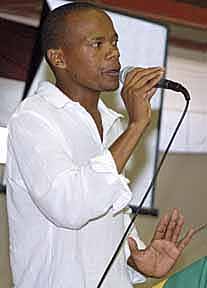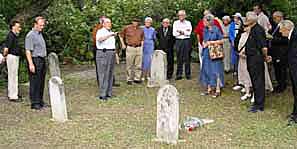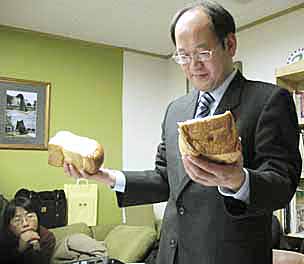Canadian Mennonite
Volume 11, No. 19
October 1, 2007
Disband the white church!
Pastor issues call for reconciliation
CAPE TOWN, SOUTH AFRICA
 |
Disband the White Church! proclaims the title of Xola Skosana’s book. Skosana, founder and lead pastor of Way of Life Church, demands the end of racially segregated churches in South Africa. He proposes that the white church dissolve and re-emerge within the black church.
Skosana’s book tells of the pain of his people, the black South Africans in Khayelitsha Township on the outskirts of Cape Town. Thirteen years after the fall of apartheid, South African reality still includes poverty, broken families, racism and struggles for liberation.
Tired of apologies, Skosana calls the white church to economic restitution, seeing this as the basis for any reconciliation. His fiery and prophetic words inspire hate, anger, bitterness, shock and accusations of mental illness from black and white Christians alike.
But his message has a different effect on some.
Meeting Skosana’s challenge head-on, Leon Oosthuizen, pastor of the Vredelust Dutch Reformed Church, responded by literally putting his money where his mouth is. Oosthuizen initiated a partnership between Vredelust and Way of Life, including dialogue as well as economic restitution. Vredelust assisted in providing computers and a full-time administrative assistant for Way of Life’s offices and the churches are planning a joint conference on mission-building next year.
Although still in its initial stages, the relationship shows a way forward towards an integrated South African church body.
Skosana likens his relationship with Oosthuizen to that of Paul and Ananias. After receiving his vision on the road to Damascus, Paul was blind and dependent on Ananias to guide him. Ananias, scared and confused, didn’t know what was going on, but he obeyed God.
“Paul puts his life in Ananias’ hands and trusts,” says Skosana, comparing Paul’s experience to his own, as he too enters a world he does not know. “But there is a growing trust and relationship between [Oosthuizen and me],” he says.
In his book Skosana charges, “White Christians would sacrifice their last meal to ensure that blacks are ‘saved,’ converted, yet will not move a finger to see to it that they are economically empowered as well.”
For Skosana, though, genuine reconciliation must include economic restitution. But considering the history of polarization and the extent of hate existing in South Africa, he is convinced that it would take a “supernatural act of God” to bring about reconciliation.
But God chooses to use people in his work, as difficult and uncomfortable as it may be, says Skosana. So, despite Skosana’s hesitations, he and Oosthuizen have met for the past 18 months to discuss different ways of doing church and how the church can change society.
Through dialogue the focus changed from critiquing to trying to find the answers. Out of their conversation the relationship spread to their congregations.
Members of Way of Life and Vredelust have visited each other’s congregations, participating as observers and worshippers. Praising God together through music is a common denominator, Skosana points out.
The partnership has been especially meaningful for the young people at Vredelust, says Oosthuizen. With unlimited choices, many choose to leave South Africa and live elsewhere. Among those who stay it is difficult to find their place and get involved in the community. The partnership “gives them a chance to contribute to the development of the country,” Oosthuizen says.
Mennonite Church Canada Witness and Mennonite Mission Network workers in South Africa also relate to Way of Life Church. Witness workers Yvonne Snider-Nighswander and Dan Nighswander spent four weeks with Way of Life earlier this year and observed the relationship with the Vredelust church first-hand.
“North Americans can walk with black churches more easily than white South Africans,” says Nighswander, “but the hard road of reconciliation and restitution is one that the South African churches must walk together.”
Skosana sees his role in the partnership as one of education. He has spoken at Vredelust several times, sharing his story to open eyes to a reality of which many are unaware. “This is the place where I feel the most vulnerable,” says Skosana of the partnership. “It’s easier to shout from the pulpit. Relationship by its very nature has a way of making you feel vulnerable, but we trust that out of vulnerability will come some healing and real insight.”
Turning 125
Fellowship, food abound at Altona Bergthaler’s 125th anniversary celebrations
ALTONA, MAN.
 |
People came from far and near, some from out of province, to join current members of Altona Bergthaler Mennonite Church for a weekend of worship services to mark its 125th anniversary on the weekend of Aug. 25-26.
Beginning with a music night on Saturday, the anniversary continued on Sunday with a service of celebration, a fellowship meal at noon, an informal afternoon program of sharing by current and former pastors, and concluded with an old-fashioned faspa.
A number also visited the gravesite of Bishop Johann Funk, at Alt-Bergthal, near Altona, with Pastor Rick Neufeld presiding over a brief service of thanksgiving.
Others took a tour to the conference memorial marker at Hochstadt, site of the first Bergthaler Church built in 1882, northeast of town. Mennonites settled here around 1876, and this church hosted the first mid-Canada Conference of Mennonites gathering in July 1903.
Funk, ordained in 1882, was the first bishop of the Bergthaler church, and many members of the Hochstadt church later became part of the Altona Bergthaler church.
At the outset of the Saturday evening festivities, pastor Rick Neufeld and council chair Byron Loeppky unveiled a 125th anniversary banner quilted by sisters Kathy Dyck and Helen Dueck and other members.
Neufeld’s Sunday message was entitled “Bearers of God’s light.” He noted that about 125 years ago Bergthalers came from Russia and met near Altona to express their faith in God. “As we reflect, I’m thankful for those who went before us, who inspired us, and gave us hope in despairing darkness,” he said. “Let’s let our lights shine.”
The Sunday afternoon program, “Remembering the past, light for the future,” gave current and former pastors the chance to reminisce and offer their insights about the church. Former pastors sharing were the first salaried minister, Henry J. Gerbrandt, David F. Friesen, Jake F. Pauls, Walter Franz, Peter Bartel, Peter Penner and Randy Klaassen (by letter).
Gerbrandt noted that when he came the Altona church was a meeting place, one of many. “Before I left, each Bergthaler church was independent, and the transition to English was well underway,” he shared.
Introducing new faces in MC Alberta
EDMONTON
 |
 |
 |
 |
September feels like the start of the church year, and Mennonite Church Alberta welcomed five new faces to its ministries last month.
Alissa Bender began as full-time associate pastor at Calgary’s First Mennonite Church on Sept. 10. Her job description includes working with youths, young adults, young families, and praise team music ministries. “I am excited about it being a position that has broad possibilities with many different age groups…it is more than a little box of a role,” Bender said. An installation service is planned for Oct. 14.
Joe Goslin (no photo available) was installed as full-time associate pastor at Rosemary Mennonite Church on Sept. 16. Goslin’s ministry will focus on youths and young families.
Joanne De Jong has begun a half-time “pastoral ministry coordinator” position at Holyrood Mennonite Church in Edmonton. De Jong’s role is to connect people’s gifts and passions to the ministries of the congregation.
Yoon Seo comes to Calgary from the Jesus Village Church in Chun Choeng, Korea, as part of Mennonite Central Committee’s International Visitor Exchange Program. During Seo’s year in Canada, he will split his time between Calgary’s Ten Thousand Villages Store and Trinity Mennonite Church. At Trinity, Seo will help plan and implement programs for youths and children. Trinity pastor Erwin Wiens is pleased with the arrangements, as they help to build relationships with the growing Korean portion of the congregation and address needs in youth ministry.
Rita Heidebrecht has been hired as quarter-time youth coordinator for MC Alberta, working with the Youth Leadership Team to plan junior and senior high snow camps, as well as coordinating communication for other province-wide youth events. Heidebrecht is also the half-time youth coordinator for Foothills Mennonite Church.
Modelling the early church
Grace and Peace Mennonite Church builds the body of Christ according to each member’s gifts
SEOUL, SOUTH KOREA
 |
Considered heretics by their fellow citizens, 30 believers gather to worship in a borrowed room. New Testament Christians from the Holy Land? Reformation leaders in Europe? Although these countercultural Anabaptists share a common vision with their predecessors, this congregation initially met in Seoul, South Korea, at the beginning of this year.
“There should be a kind of real church that can be restored to the early church in the Bible,” says pastor Guishik Nam, a member of Grace and Peace Mennonite Church’s pastoral leadership team, who preaches, provides pastoral care and trains other leaders. “But I had no idea [what that church was] until I met [the] Mennonite Church.”
Grace and Peace distinguishes itself from other Korean denominations by committing itself to the gospel of peace, following Jesus’ teachings and making community life a priority.
“Most Korean churches depend on one big pastor, but Grace and Peace is building the body of Christ according to each member’s gifts,” explains worship minister Seong Han Kim, who is also director of central media for Korea Inter-Varsity Christian Fellowship.
Through Nam’s studies at Associated Mennonite Biblical Seminary in Elkhart, Ind., and by attending Mennonite churches in that area, he learned more about the history of the Mennonite Church, which inspired him as a model of what the early church would look like in present times.
Nam interned with Yellow Creek Mennonite Church in Goshen, Ind., where his vision of planting the first Mennonite congregation in Korea came into focus. Nam stayed on at Yellow Creek for nearly a year after his initial nine-month term, to further nurture this dream.
Grace and Peace Mennonite Church meets at the Connexus Language Institute, a Korea Anabaptist Center (KAC) program, but members pray for their own church building to help in developing community life and provide opportunities to meet during the week.
On Easter Sunday members of Grace and Peace shared Jesus’ joy in a colourful way. After hard-boiling 200 eggs and wrapping them carefully in bright paper, they knocked on their neighbours’ doors and offered them a small package of two eggs and the greeting, “Our Lord Jesus Christ has risen!”
“It was a wonderful time to share the good news with our neighbours,” Nam says.
Political and military tensions with neighbouring North Korea still run high. The new congregation sends books and gifts to young men who are in prison because of their conscientious objection to compulsory military service.
“The church is open to identifying a Korean way of interpreting the meaning of ‘peace church,’” says Jaeyoung Lee, a church leader and director of peace education at KAC.
The majority of Koreans think of Mennonites as radicals who do social justice without believing in Jesus Christ as their Saviour, says Nam, adding that many pastors still teach their congregations that Mennonites are heretics because they think Mennonite theology is too liberal to be in keeping with Christian beliefs.
As a pioneering congregation, Grace and Peace follows in the footsteps of the first Mennonite leaders. They do not fear society’s judgment and eagerly spread a revolutionary message: The gospel of peace.